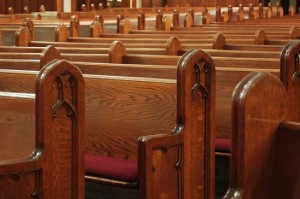 “If our church were to disappear tomorrow, would anybody miss it, and if so, who?” That is a great question. I ran across it recently in a book about church leadership, Managing the Congregation. The author relates the following story:
“If our church were to disappear tomorrow, would anybody miss it, and if so, who?” That is a great question. I ran across it recently in a book about church leadership, Managing the Congregation. The author relates the following story:
Terry Fullam was ready to be questioned during his first interview as a potential candidate at St. Paul’s Episcopal Church in Darien, Connecticut. Upon meeting with about twenty people from the church, no one seemed to have anything to ask. It appeared that quite a few had already made up their minds. He had written out a hundred questions he wanted to raise and, when no one was forthcoming, he asked the first one: If this church were to disappear tomorrow, would anybody miss it?
A ton of silence fell upon the room. No one breathed; all looked straight ahead for several seconds. Then they began to look at each other, seemingly embarrassed. Finally someone said, “Probably not much.” Fullam then asked, “Do you really want to be a church, or are you actually looking for a chaplain for your club?” More silence.
That story resonates with me powerfully. I remember the time leading up to my arrival here at Mt. Pleasant as your pastor in May, 2001. Amy and I drove the thirteen hours from New England and had eight interviews in central and western Pennsylvania in about 4 days. This experience did not encourage us about the state of the church! Most of the churches had almost no questions to ask whatsoever. They would take us out to a nice dinner, politely answer all of our questions, and seem to be oblivious to the fact that we found it odd they weren’t more inquisitive about us. The only unspoken question that we could read loud and clear was, “So will you please be our pastor?” We would often leave and look at one another in sadness. Where was the drive for the gospel? Where was the zeal for Christ’s Church? In my mind calling a pastor is not a matter of disinterest; the stakes are high. “They didn’t even ask about my prayer life,” I would marvel. “They didn’t ask about my gifts or interests or passions or weaknesses.” It was really quite shocking. I was left with the impression that most folks were looking for a “chaplain” for their “club.” A very different thing from what I felt called to be: a shepherd to a flock, a group of Christ-loving disciples who wanted to honor Christ in worship, and to reach the lost all around us.
My favorite visit was to Mt. Pleasant Church. It was great, though not obviously so at first. Right after passing the Raccoon Township sign (complete with a raccoon) the hood of our new car was greeted by a Raccoon Township deer. He trotted away none the worse for wear; our car couldn’t say the same. When we arrived at the church we underwent the most grueling of interviews. We were asked a lot of tough questions; we were really grilled. “I don’t think that went very well,” Amy said as we drove back to her parents’ home in Grove City that evening.
But the challenge of the process was part of what made me want to pastor that church; it seemed to be the only place we had seen that showed signs of life. There were youth everywhere the moment we walked in the door, kicking balls and running all over the place; a drama troupe was practicing in the sanctuary. And best of all, the nominating committee actually cared; they asked tough questions because it actually mattered to them. And they most certainly did not want a chaplain for their club. By the time we dragged into Grove City, exhausted from interviews and vehicular collisions, a message had arrived from the Nominating Committee at Mt. Pleasant church; a call was being extended, not to chaplain a club, but to pastor a church.
If our church was to disappear tomorrow who would miss it? Would anyone? In an effort to keep this article short I can’t even list all of those who would be affected. Our missionaries, our Childcare families, the children and youth of our community, the soup eaters, the egg decorators, the cake makers’ and those pilgrims on the Way, those who have found or are moving closer to seeing the Light of the World, tasting the Living Water. So much would be lost without our church.
Yet, I can’t help but think with sadness of those many places that had once been churches but are now clubs. How did that happen? When did it happen? Could it happen to us?
Yes it could. If we forget our purpose. If we neglect our call. If the fire of the Spirit is quenched. If the Word of God is diluted. If our lights are hidden under a bushel. Don’t let that happen! Let’s all devote ourselves wholeheartedly to being a church, not a club. I likewise pledge to you that I will be your pastor, not your chaplain.
Shawchuck, N., Heuser, R., Managing the Congregation, Abingdon: Nashville, 1996, p. 78